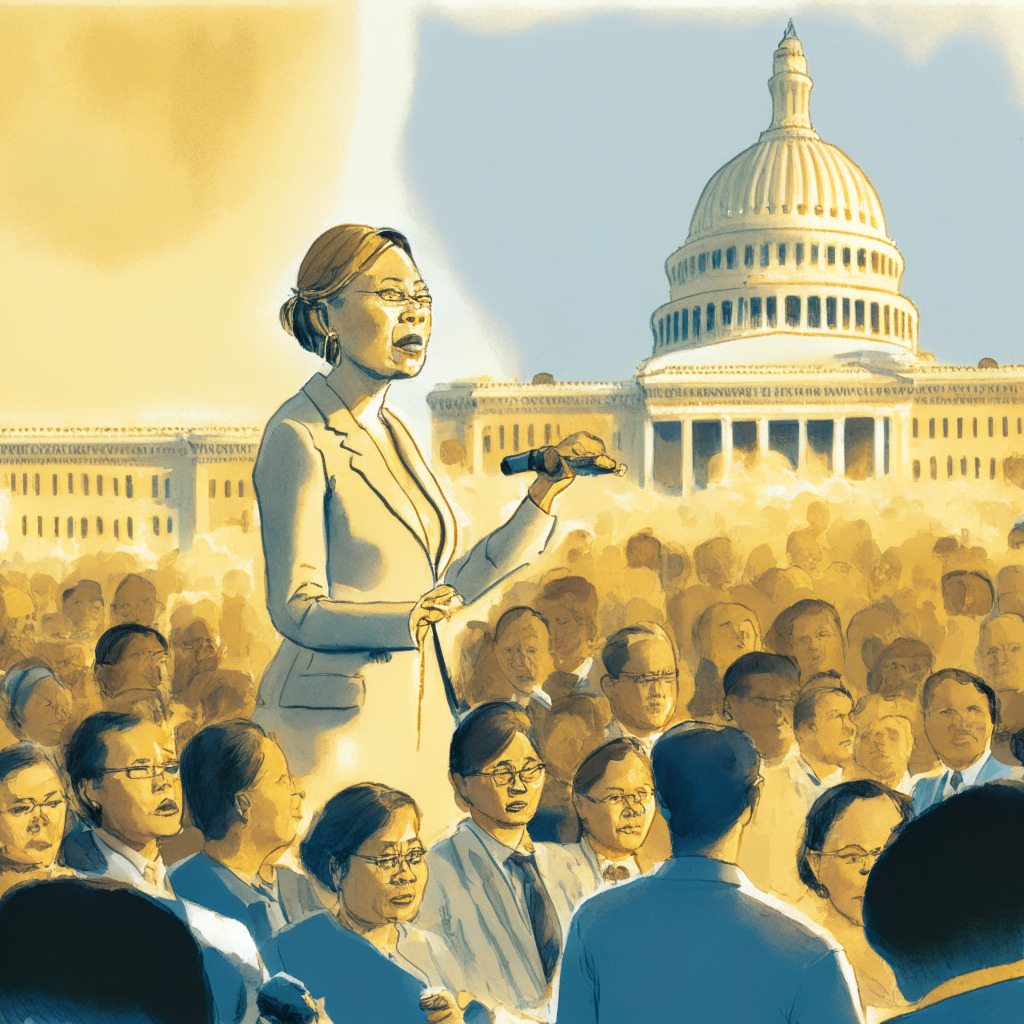US Senator Elizabeth Warren plans to introduce a bill closing cryptocurrency loopholes, asserting crypto payments fuel the Chinese fentanyl trade. The controversial stance sparks mixed reactions and divides political leaders, while raising questions on the future of the cryptocurrency industry amid regulatory scrutiny.
Search Results for: Elizabeth Warren
Senator Warren’s Anti-Crypto Agenda: How KYC & AML Challenges Can Make or Break Blockchain
The “anti-crypto army” led by US Senator Elizabeth Warren has intensified scrutiny on the blockchain industry, citing concerns over financial crime and national security. The crypto community fears that a broad regulatory approach may hinder the industry’s growth and undermine decentralization aspects of Web3.
Cryptocurrency and Fentanyl Crisis: Senator Warren’s Regulatory Push Amid Alarming Stats
Sen. Elizabeth Warren calls out cryptocurrency’s role in fentanyl drug transactions, highlighting her Digital Asset Anti-Money Laundering Act. Cryptocurrency enabled 90 Chinese suppliers to exchange precursor drugs, producing $54 billion worth of fentanyl pills, causing concerns over crypto’s potential to facilitate illegal activities.
Crypto Bill Stalled: The Battle of Warren, Marshall, and the Quest for Sponsorship
Senators Elizabeth Warren and Roger Marshall’s cryptocurrency anti-money laundering bill, the Digital Asset Anti-Money Laundering […]
Navigating Uncharted Waters: The Question of Crypto Regulation and Tax Evasion
Senators Elizabeth Warren and Bob Casey are urging strict enforcement of crypto reporting requirements within the Infrastructure Investment and Jobs Act (IIJA), suggesting clear tax reporting guidelines for digital asset “brokers”. This measure aims to close the $50 billion “crypto tax gap”, addressing the tax evasion in the crypto industry.
Closing the $50 billion Crypto Tax Gap: Urgent Measures or Rushed Consequences?
Democratic Senators, including Elizabeth Warren and Bernie Sanders, urged the IRS and the Treasury Department to expedite new crypto tax regulations to close a potential “$50 billion crypto tax gap.” They expressed concerns about potential loss of $1.5 billion in government tax revenue for 2024 due to delay in the implementation. This is amid a wider conversation for more transparency in the bourgeoning cryptocurrency sector.
Unlikely Alliances and Divisive Lines: When Crypto Regulations Meet Freedom of Decentralization
The Bank Policy Institute (BPI) sides with Senator Elizabeth Warren to tighten cryptocurrency regulations via the Digital Asset Anti-Money Laundering Act, causing contention with crypto veterans. The bill requires enhanced surveillance and customer identity tracking, while banning digital asset mixers in efforts to prevent illicit activities. This raises questions about the balance between regulation and market freedom in cryptocurrencies.
US Banking Advocacy Group Backs Crypto Legislation: A Balance Between Regulation and Anonymity
Senator Elizabeth Warren’s reintroduced crypto legislation aims to bring transparency to digital asset transactions to mitigate risks of money laundering and terrorism financing. It requires digital asset wallets, blockchain transaction validators, and miners to preserve customers’ identity records, which may impact the crypto community’s cherished values of security, anonymity, and independence.
Winklevoss Warns Democratic Crypto Stance Could Cost Youth Vote and Elections
Crypto billionaire Cameron Winklevoss warns that Senator Elizabeth Warren and SEC Chairman Gary Gensler’s pushback against crypto may alienate potential Democratic supporters, particularly Millennials and Gen Z voters. As younger generations increasingly embrace crypto’s potential applications and investments, the growing regulatory scrutiny could negatively impact their affinity towards the Democratic party.
Crypto Wars: Democrats Risk Alienating Youth Voters with Anti-Crypto Stance
Crypto billionaire Cameron Winklevoss warns that the war on cryptocurrencies led by U.S. Senator Elizabeth Warren and SEC Head Gary Gensler could alienate Millennials and Gen Z, potentially impacting Democratic voter support. Not all Democrats share anti-crypto sentiment, as the debate around regulations continues to shape the political landscape.
Binance Investigation Request: Truth, Misunderstanding, and the Crypto Industry’s Integrity
Senators Elizabeth Warren and Chris Van Hollen have requested an investigation into Binance for potentially lying to Congress about its relationship with Binance.US. The exchange faces accusations of secretly controlling Binance.US and misleading investors, raising questions about its compliance with regulations and the necessity for transparent communication in the crypto industry.
Senators Call for Binance Investigation: Regulatory Oversight or Stifling Innovation?
Senators Elizabeth Warren and Chris Van Hollen called on the DOJ to investigate Binance and Binance.US for allegedly misleading Congress. Amid increased government pressure, discussions around the future of cryptocurrencies and necessary regulations continue, highlighting the importance of balancing regulatory oversight and innovation.
Binance Under Fire: US Senators Accuse Exchange of Deception and Seek Investigation
Binance faces scrutiny from US lawmakers, including Senators Elizabeth Warren and Chris Van Hollen, who accuse the exchange of potentially providing false information about its operations and local relationships. The situation underscores growing concerns regarding the regulation and compliance of cryptocurrency exchanges.
Binance Investigation: Striking the Balance Between Innovation and Regulation
Senators Elizabeth Warren and Chris Van Hollen urge US Justice Department to investigate Binance amid SEC’s 136-page complaint, alleging Binance.US is not a separate entity and its former Chief Compliance Officer violated US regulations. This case highlights the importance of transparency and potential consequences of misleading information in the evolving crypto industry.
Binance-US Controversy: Senators Call for DOJ Investigation, Impact on Crypto Industry
Senate Democrats Elizabeth Warren and Chris Van Hollen call for a U.S. Department of Justice investigation into Binance over alleged false statements and the questionable independence of Binance.US. The outcome could impact the crypto ecosystem’s progress, trust in exchanges, and regulatory actions.
Connecting the Dots: Crypto Lawsuits, Politics, and the Race for CBDC Dominance
John Deaton, a lawyer representing XRP token holders, suggests political motives could influence legal actions against major crypto exchanges like Binance and Coinbase. He proposes connections between Senator Elizabeth Warren, SEC Chair Gary Gensler, and a push for launching central bank digital currencies (CBDCs) as potential explanations for aggressive enforcement.
Cryptocurrencies, Fentanyl, and China: Balancing Regulation and Innovation
Senator Elizabeth Warren highlighted a connection between cryptocurrency payments and China-based firms supplying fentanyl precursors, raising concerns on the need for effective cryptocurrency regulations. Critics argue that imposing more regulations might hinder the growth and innovation of blockchain technology. Senator Warren plans to reintroduce legislation addressing the regulatory gaps related to illicit cryptocurrency use while safeguarding potential innovations in finance.
Cryptocurrency, Fentanyl Trade, and Balancing Regulation: An In-Depth Analysis
Senator Elizabeth Warren highlights the connection between cryptocurrency and the Chinese fentanyl trade, proposing the Digital Asset Anti-Money Laundering Act to halt such transactions. Striking a balance between security and innovation is crucial in regulating the blockchain and digital asset sector.
Digital Asset AML Act: Regulating Crypto or Hindering Blockchain Progress?
Senators Elizabeth Warren and Roger Marshall have introduced the Digital Asset Anti-Money Laundering Act, aiming to close loopholes in the crypto industry. However, the proposed law seems at odds with the reality that most money laundering cases still involve fiat currencies, and law enforcement’s proven ability to prosecute crypto-related money laundering. The bill’s necessity should be scrutinized, considering potential alternatives without harming underlying technology.
Reintroduction of Digital Asset Anti-Money Laundering Act: National Security vs Crypto Privacy
Sen. Elizabeth Warren plans to reintroduce the Digital Asset Anti-Money Laundering Act, aiming to curb money laundering and terrorist financing in crypto. The bill focuses on law enforcement and national security, extending KYC requirements and prohibiting transactions with digital asset mixers.
The Intricate Web of Illicit Fentanyl Trade Powered by Cryptocurrency
The U.S Treasury’s Office of Foreign Assets Control (OFAC) has targeted several cryptocurrency wallets involved in the illicit trade of fentanyl. Most transactions were conducted via Stablecoins on Ethereum and Tron networks. These wallets, save for one, were hosted on a centralized crypto exchange, allowing the illicit flow of hundreds of thousands of dollars worth of cryptocurrency.
Crypto Wallet Sanctions: A Necessary Countermeasure or a Threat to Blockchain Progress?
“US authorities sanctioned a series of crypto wallets connected to fentanyl manufacturing, casting a sceptical light on the blockchain sphere. These developments spotlight identity concealment and transaction monitoring issues on blockchain platforms. Balancing the issue, blockchain’s global scalability brings potential for a more democratised financial future, requiring robust regulations and security measures.”
Regulatory Tug-of-War: SEC Scrutiny on Prager Metis Over FTX Audits – Decoding the Implications
“The United States SEC is taking legal action against Prager Metis, an auditing firm previously employed by FTX, allegedly violating auditor independence rules. This scandal begs vital questions about corporate governance and ethical practices in the crypto industry, and whether current regulation methods could inhibit the sector’s innovation and growth.”
Balancing Act: US Bill Stirs Debate on Off-Chain Transactions Regulation
A new U.S bill introduced by Representative Don Beyer, aims to regulate off-chain crypto transactions by requiring service providers to report all such transactions to a CFTC-registered repository. The bill strives for increased transparency to prevent potential disputes, manipulation, and fraud, although concerns about privacy infringement and stifling innovation are being raised.
Bipartisan Battle for Crypto: A Deep Dive into U.S. Digital Asset Regulation
Senators Kirsten Gillibrand and Cynthia Lummis have introduced a new crypto bill, the Responsible Financial Innovation Act, aimed at addressing regulatory ambiguity in the US cryptocurrency industry. This legislation could shift the oversight of most digital assets from SEC to the Commodity Futures Trading Commission.
CoinShares Boldly Enters US Market despite Regulatory Tumult: A Risky Gamble or Calculated Maneuver?
CoinShares, a popular crypto asset manager, is expanding its market to the US, focusing on cryptocurrency investors with private investment products. Despite possible legal and regulatory challenges, CoinShares is optimistic about navigating the US crypto climate. Its new venture offers a hedge against interest rate-driven volatility in the crypto market.
Advocacy Group Coin Center Pushes for More Refined Crypto Tax Policies
Crypto policy experts at Coin Center are advocating for a better tax policy for digital assets. They propose a nominal exemption for small crypto transactions, no tax on block rewards until sold, and simpler methods for determining cryptocurrency donation amounts. They also emphasize the need for tax policy clarity for third-party non-custodial intermediaries in digital asset transactions.
Unmasking the Paradox: Coinbase’s ‘Stand with Crypto Alliance’ and the Ethics Dilemma
“Cryptocurrency giant Coinbase recently launched the ‘Stand with Crypto Alliance,’ aimed at fostering dialogue between crypto holders and lawmakers. Despite featuring controversial figures, the initiative has made significant strides with over 54,000 individuals signing on. This move signals a potential shift in the crypto industry’s direction.”
Bipartisan Crypto Support: Accelerating Adoption or Facing Opposition?
“Cryptocurrency finds itself adopted by parties on both sides of Washington’s political divide, evolving from being a niche technology to a politically intriguing topic. Coincidentally, support seems almost equal, with 26 Republicans and 22 Democrats in the House, and 24 Republicans and 11 Democrats in the Senate advocating for crypto. Criticism exists too, demanding more transparency and protection of traditional institutions.”
Shifting Political Winds: Potential Impact on US Crypto Regulatory Landscape Post 2024 Election
Recent comments from former SEC official John Reed Stark suggest potential changes to U.S. crypto regulation influenced by party politics. Stark attributes a pro-crypto regulation shift to a possible Republican win in 2024, ending current SEC chair Gensler’s tenure, and potentially paving the way for Hester Peirce, known for her softer stance on crypto.
Unleashing Stablecoins: Assessing PayPal’s PYUSD Launch Amid Political Divides and Regulatory Turbulence
“PayPal’s recent launch of its stablecoin, PYUSD, under the regulatory framework of the New York Department of Financial Services has stirred conversations about stablecoin adoption. Unlike Meta’s unsuccessful Libra, PayPal’s project is viewed more favorably politically, indicating an imminent regulatory framework for stablecoins in the U.S.”
Regulation Tug-of-War in Crypto: FTX’s Struggle and a Reassessment of Tax Policy
FTX, a prominent cryptocurrency exchange, faces criticism from creditors over its reorganization plan. Amid regulatory concerns, the exchange is attempting to revitalize its operations, particularly its Dubai unit. Meanwhile, the US Internal Revenue Service mandates that crypto investors must report rewards as part of their gross income, and the Department of Justice considers charging crypto exchange Binance with fraud allegations. These incidents underscore the pressing need for regulatory clarity in the crypto economy to maintain investor trust.































